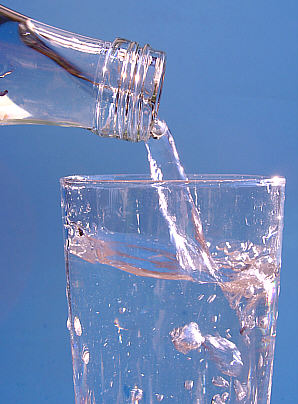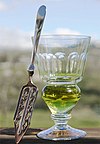The Drink Portal
A portal dedicated to all beverages
Introduction

A drink or beverage is a liquid intended for human consumption. In addition to their basic function of satisfying thirst, drinks play important roles in human culture. Common types of drinks include plain drinking water, milk, juice, smoothies and soft drinks. Traditionally warm beverages include coffee, tea, and hot chocolate. Caffeinated drinks that contain the stimulant caffeine have a long history.
In addition, alcoholic drinks such as wine, beer, and liquor, which contain the drug ethanol, have been part of human culture for more than 8,000 years. Non-alcoholic drinks often signify drinks that would normally contain alcohol, such as beer, wine and cocktails, but are made with a sufficiently low concentration of alcohol by volume. The category includes drinks that have undergone an alcohol removal process such as non-alcoholic beers and de-alcoholized wines. (Full article...)
Selected article -
The seeds of the Coffea plant's fruits are separated to produce unroasted green coffee beans. The beans are roasted and then ground into fine particles typically steeped in hot water before being filtered out, producing a cup of coffee. It is usually served hot, although chilled or iced coffee is common. Coffee can be prepared and presented in a variety of ways (e.g., espresso, French press, caffè latte, or already-brewed canned coffee). Sugar, sugar substitutes, milk, and cream are often added to mask the bitter taste or enhance the flavor.
Though coffee is now a global commodity, it has a long history tied closely to food traditions around the Red Sea. The earliest credible evidence of coffee drinking as the modern beverage appears in modern-day Yemen in southern Arabia in the middle of the 15th century in Sufi shrines, where coffee seeds were first roasted and brewed in a manner similar to how it is now prepared for drinking. The coffee beans were procured by the Yemenis from the Ethiopian Highlands via coastal Somali intermediaries, and cultivated in Yemen. By the 16th century, the drink had reached the rest of the Middle East and North Africa, later spreading to Europe. (Full article...)
Did you know? -
- ... that Al-Rantisi Hospital can extract drinking water from air?
- ... that the relatively low standards of player selection for Somerset County Cricket Club in 1883 have been described as being "determined with a nod and a wink over drinks"?
- ... that the "Mayor of Picklesburgh" is decided by a pickle juice drinking competition?
- ... that The Drunkard's Progress suggests that a single social drink leads to poverty, crime, and suicide?
- ... that Maxine North swore never to return to Thailand after the death of her undercover CIA husband, but ultimately settled there and introduced bottled water to the country?
- ... that the John Snow pub is named for a shy British epidemiologist who did not drink?
General images -
Selected image -

Selected biography -
Selected quote -
| “ | Coffee should be black as hell, strong as death, and sweet as love. | ” |
| — Turkish proverb |
Selected ingredient -
Topics
| General topics: | Bartending • Bottling • Drinking • Drinking water • Bottled water • Mineral water • Coffee • Energy drink • Juice • Tea • Milk • Plant milk • Pasteurization • Refrigeration • Steeping • Water purification |
| Alcoholic beverages: | Beer • Brandy • Brewing • Caffeinated alcoholic drinks • Cider • Cocktails • Distillation • Fermentation • Hard soda • Liquor • Liqueur • Malt drink • Mead • Proof • Rice Wine • Schnapps • Vodka • Whiskey • Wine |
| Soft Drinks: | Carbonation • Cola • Orange soft drink • Frozen carbonated drink • Root beer • Soda water • Lithia water • |
| Miscellaneous: | Drink industry • Lemonade • Limeade • Orange drink • Slush (beverage) |
List articles
Subcategories
Related portals
WikiProjects


WikiProject Food & Drink is an association of Wikipedians with an interest in culinary-related subjects. They have come together to co-ordinate the development of food and drink articles here on Wikipedia as well as the many subjects related to food such as foodservice, catering and restaurants. If you wish to learn more about these subjects as well as get involved, please visit the project.
 WikiProject Beer – covers Wikipedia's coverage of beer and breweries and microbreweries
WikiProject Beer – covers Wikipedia's coverage of beer and breweries and microbreweries
![]() WikiProject Wine – aims to compile thorough and accurate information on different vineyards, wineries and varieties of wines, including but not limited to their qualities, origins, and uses.
WikiProject Wine – aims to compile thorough and accurate information on different vineyards, wineries and varieties of wines, including but not limited to their qualities, origins, and uses.
| Child projects: | Task forces: (All inactive) |
| Related projects: | |
Things you can do
 |
Here are some tasks awaiting attention:
|
Associated Wikimedia
The following Wikimedia Foundation sister projects provide more on this subject:
-
Commons
Free media repository -
Wikibooks
Free textbooks and manuals -
Wikidata
Free knowledge base -
Wikinews
Free-content news -
Wikiquote
Collection of quotations -
Wikisource
Free-content library -
Wikiversity
Free learning tools -
Wiktionary
Dictionary and thesaurus




































































